Two Chicago pastors address a tough question


P. 11

Two Chicago pastors address a tough question


P. 11
Wake Forest, N.C. | The April meeting of Southeastern Baptist Theological Seminary’s trustees was marked by an historic moment in the Southern Baptist Convention: the election of Becky Gardner as trustee chair. Gardner, a member of Woodland Baptist Church in Peoria, is believed to be the first female trustee chair for a seminary, according to Southeastern’s examination of SBC Annuals.
She is one of two Illinois Baptists recently elected to a prominent role in Southern Baptist life. Adron Robinson, IBSA president and pastor of Hillcrest Baptist Church in Country Club Hills, was elected to the search committee charged with nominating the next president of the Executive Committee.
Gardner, a Southeastern trustee since 2010, is superintendent of Peoria Christian School. Her husband, Joe, is an IBSA zone consultant and director of missions for the Metro Peoria Baptist Association.
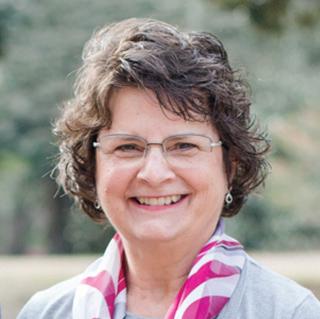
P.





NATE ADAMS

Mothering
Gaines calls for unity and prayer
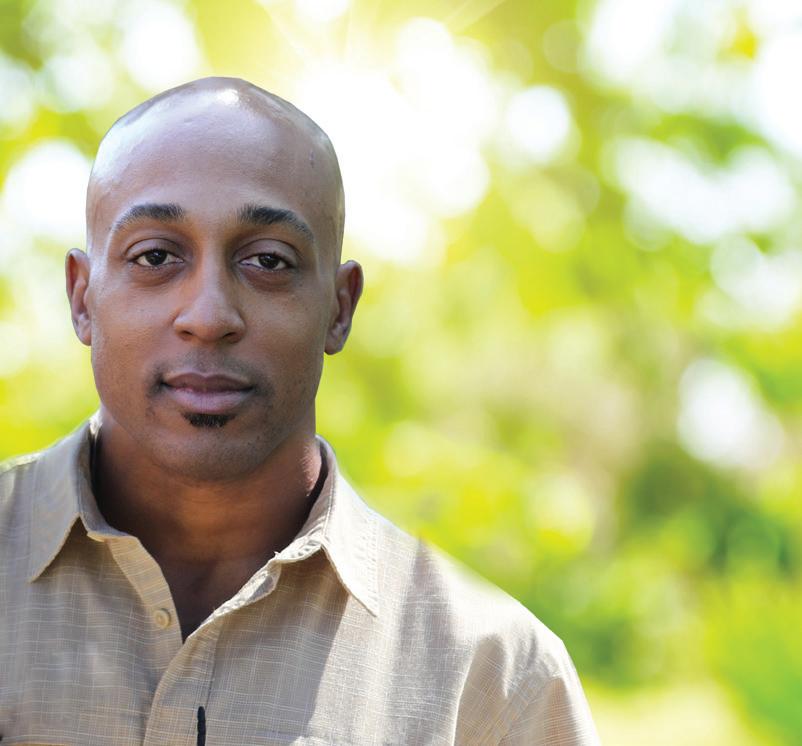
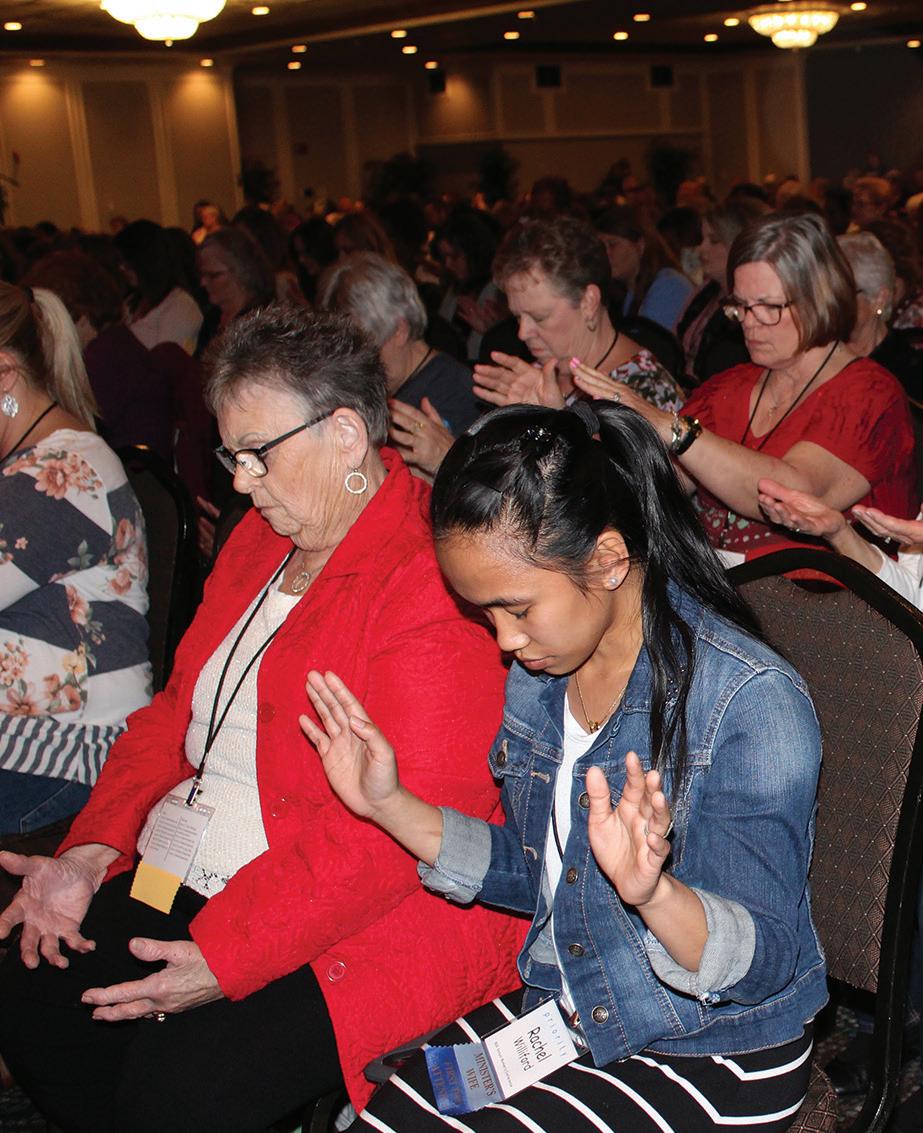
Notebook: Patterson and other controversies

As Illinois turns 200 in 2018, IBSA is seeking to engage at least 200 churches in each of these challenges. Is your church one of them?
As of April 30
GO
ENGAGE NEW PEOPLE – Evangelism
Goal: 200
NATE ADAMSDuring the years I played basketball, my teams had some winning seasons and some losing seasons. After one of those losing seasons, our coach decided to make some changes. They weren’t personnel changes—our best players were on the floor most of the time. The problem was that most of our competitors were taller and bigger than we were. And none of us were great outside shooters.
127
MAKE NEW SACRIFICES – Missions Giving
DEVELOP NEW LEADERS – Leadership Development
Churches Churches Churches Churches
Total Participating Churches: 132
Read more about these challenges and register your church for one or more at IBSA.org/Pioneering, or contact IBSA’s John Carruthers at (217) 391-3110 or JohnCarruthers@IBSA.org.
Celebrating our state and Baptist work across two centuries
Baptists had been on scene almost two decades when explorers Lewis & Clark met up St. Louis in 1804 to start their expedition to find the Northwest Passage. There was one Baptist church in Illinois in 1796, and 35 by the time of Illinois’ statehood in 1818.
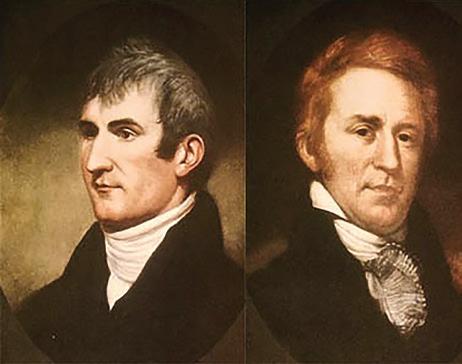
Giving by IBSA churches as of 4/27/18
$1,931,260
Budget Goal: $2,059,615
Received to date in 2017: $1,846,326
2018 Goal: $6.3 Million
Editor - Eric Reed
Managing Editor - Meredith Flynn
Graphic Designer - Kris Kell
Contributing Editor - Lisa Misner
Multimedia Journalist - Andrew Woodrow
Administrative Assistant - Leah Honnen
The general telephone number for IBSA is (217) 786-2600. For questions about subscriptions, articles, or upcoming events, contact the Illinois Baptist at (217) 391-3119 or IllinoisBaptist@IBSA.org


The Illinois Baptist is seeking news from IBSA churches. E-mail us at IllinoisBaptist@IBSA.org to tell us about special events and new ministry staff.

POSTMASTER: The Illinois Baptist is owned and published every three weeks by the Illinois Baptist State Association, 3085 Stevenson Drive, Springfield, Illinois 62703-4440. Subscriptions are free to Illinois Baptists. Subscribe online at IBSA.org.
But we were quick. And we played hard. And by the start of the next season, our coach made sure we were in excellent condition. Because his new strategy, and our new life, we learned, was defense.
At first we complained, at least among ourselves, because three-fourths of our practice time focused on guarding and running. Most basketball players like to shoot the ball. But our coach shook off our looks of discouragement with this promise: “Guys, this year our best offense is going to be good defense.” And as our defense created steals, and those steals created easy baskets for us, we grew to believe him. It was good defense that was creating new opportunities, and victories, for us.
For churches in today’s rapidly changing moral and legal climate, good defense is also essential. Religious freedom is being assaulted again and again, and often by giant, imposing foes that can range from the courts, to the schools, to the entertainment elite, to the culture itself. Churches that were once noted for the good they do are now often viewed with distrust and, in some cases, those churches face direct legal challenges.
One excellent “coach” in this changing and challenging climate is a Christian organization named Alliance Defending Freedom. ADF has over 23 years of experience providing religious freedom legal services to churches and Christian organizations, and has played a role in at least 52 Supreme Court victories. Now, through its recently developed Church Alliance program, it provides member churches with religious freedom legal services ranging from facility or land use, to unconstitutional regulation, to tax exemption issues.
Churches that join ADF’s Church Alliance program receive a religious liberty audit, including legal review of church bylaws and policies. They receive direct access to attorneys to answer the church’s questions about protecting its religious liberty. And they can receive consultation and/or legal representation in cases involving the church’s religious liberty.

Seeing that these services are now so valuable to churches, IBSA recently entered a partnership agreement with ADF to provide these services to IBSA churches for a flat annual membership rate, regardless of the church’s size. In fact, IBSA believes so strongly in the value of these services for individual churches, that IBSA will pay half of the first year’s annual $250 fee for any IBSA church that enrolls in ADF’s Church Alliance program. The religious liberty audit of a church’s key documents alone is worth well more than this amount, especially compared to the cost of an individual attorney for these services.
You can learn more about Alliance Defending Freedom, and receive the halfprice IBSA church partnership discount, through the IBSA.org website, or call or e-mail the IBSA offices for a free brochure on how the ADF Church Alliance program works.

For my basketball team, playing serious defense was a game-changer, and a season-changer. We scored more points, and we won more games. But our offense was triggered by a solid, hard-working defense.
I am hopeful that hundreds of our IBSA churches will realize the threat they are facing, and get serious about defending their biblical beliefs and religious freedoms. Perhaps in doing so, we will also find new opportunities to go on offense with the gospel. Sometimes the best offense really is a good defense.

Nate Adams is executive director of the Illinois Baptist State Association. Respond at IllinoisBaptist@IBSA.org.
See ADF ad on page 15 for registration information.

A new resource offers IBSA churches help in defending their biblical beliefs.
“Throughout my life I have tried to prayerfully walk through the doors of opportunity that the Lord brings my way,” Gardner told the Illinois Baptist. “As a Christian school educator and a pastor’s wife, I see the value of preparing the next generation to be equipped with a biblical worldview as they answer God’s call for their life.”
Southeastern is one of the Southern Baptist Convention’s six seminaries. Headquartered in North Carolina, the seminary is led by President Danny Akin.
“It is a privilege to see God working and moving at SEBTS to grow the Kingdom through the church with a Great Commission focus as we impact the world for Christ,” Gardner said. “It is a blessing to serve in this role as Dr. Akin and his team lead SEBTS to fulfill its mission.”
The Executive Committee’s presidential search committee was elected during a special called meeting April 17, prompted by the March 27 departure of former EC President Frank S. Page, who cited a personal failing in his resignation.
The six elected committee members were chosen from a field of 18 nominees. Robinson said he is honored to represent Illinois on the search committee.

“The committee is a diverse collection of SBC servants committed to following God’s direction in finding the next president of the EC,” Robinson said. “Someone who loves the Lord, loves his people, and loves the SBC.
“Please pray for the search committee in the days ahead.”

The six-member committee will be joined in an ex officio capacity by the next EC chairman when he or she is elected in June, as stipulated by EC bylaws. The new EC chair will be a voting member of the search committee.
Current EC chairman Stephen Rummage was elected to the search committee and therefore is not serving in an ex officio capacity. He will continue serving on the search committee when his term as EC chairman ends.
The group held their first meeting immediately after being elected. They plan to release an email address through which they’ll receive nominations, said search committee chair Steve Swofford.
“We have all agreed to approach this responsibility with no agenda, simply and diligently trying to find the best person for the hour to fill this critical position for these challenging times,” Swofford said. “We covet the prayers of all Southern Baptists.”
– With reporting from Baptist Press





Washington, D.C. | Two Southern Baptist entities have urged a federal appeals court to uphold the constitutionality of the ministerial housing allowance.
GuideStone Financial Resources and the Ethics & Religious Liberty Commission (ERLC) signed on to a friend-of-the-court brief filed April 26 that asks the Seventh Circuit Court of Appeals in Chicago to reverse a lower court decision invalidating the exemption, which permits “ministers of the gospel” to exclude for federal income tax purposes a portion or all of their gross income as a housing allowance.
In October, federal Judge Barbara Crabb of Wisconsin ruled the allowance is an unconstitutional violation of the First Amendment clause that prohibits a government establishment of religion.
GuideStone—the SBC’s health and financial benefits entity – is a member of the Church Alliance, which filed the brief in the case. The alliance is a broad coalition of denominational pension programs that cover ministers who qualify for the housing allowance.

“We have always felt that the cash housing allowance offers a level playing field, ensuring the government does not favor secular employers over churches or churches who provide their ministers a physical dwelling at the expense of those that do not,” said GuideStone President O.S. Hawkins.
GuideStone is still committed as a member of the Church Alliance and in unity with the other Southern Baptist entities “in advocating on behalf of pastors and other ministers eligible for the housing allowance,” he said.
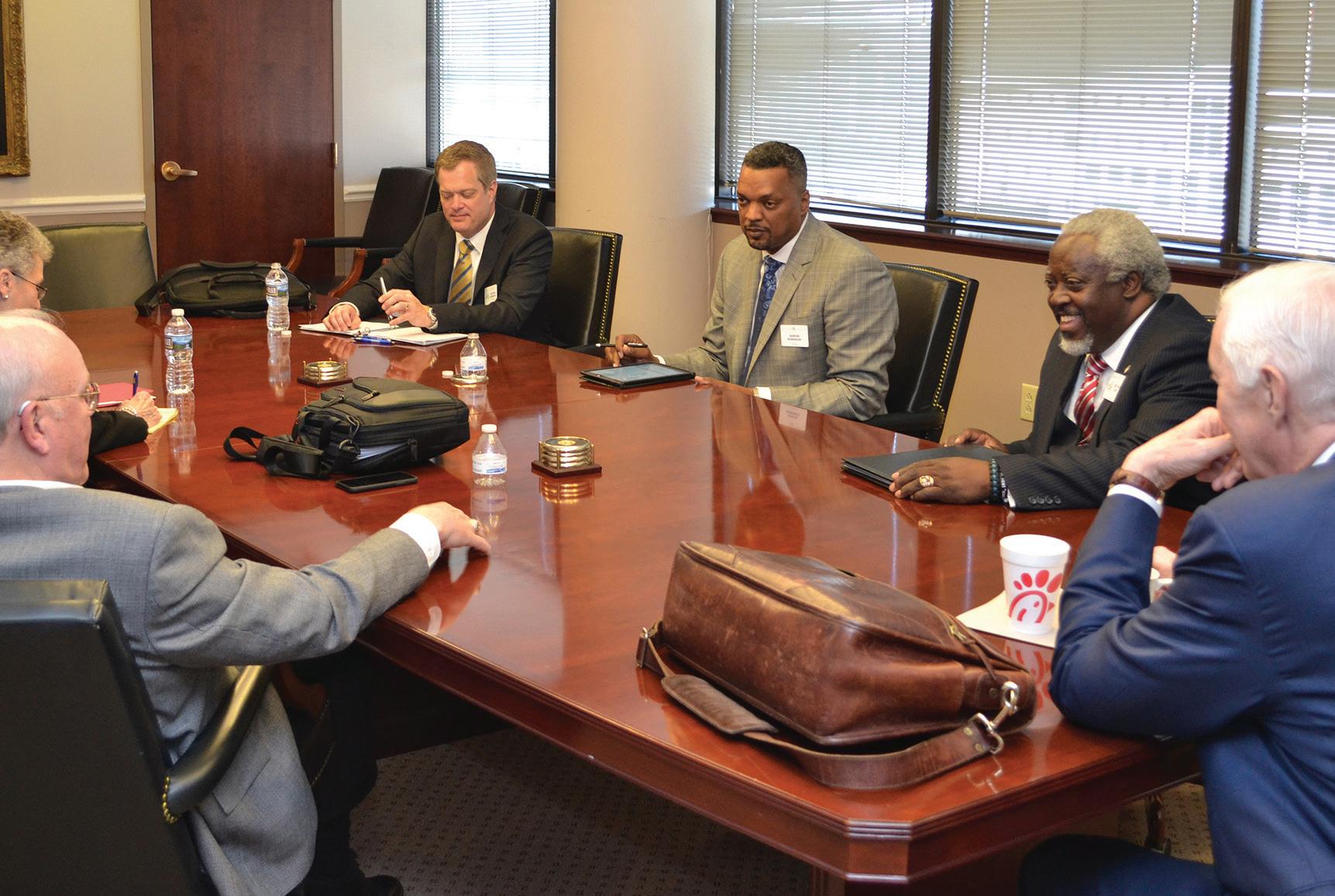
ERLC President Russell Moore said the commission signed on to the brief “for the sake of religious liberty, the freedom of the church, and also the flourishing of local communities.”
“As the brief argues, leaving religions alone actually respects the separation of church and state,” Moore told Baptist Press. “More still, eliminating the allowance would have the effect of penalizing thousands of small congregations and their leaders across the country. We will continue to fight to protect the housing allowance because we believe clergy are essential for flourishing, vibrant communities.”
– From Baptist Press

Illinois legislators are still considering a bill that would require public schools to include study of the role and contributions of lesbian, gay, bisexual, and transgender people.
Introduced by Sen. Heather Steans (D-Chicago), the bill currently has versions in both chambers of the General Assembly, and is awaiting a third reading in the Senate and House.
Opponents of the bill, including the non-profit Illinois Family Institute, are asking Illinoisans to call their state representatives and senators and urge them to reject the legislation.
Wheaton College’s Ed Stetzer called for Paige Patterson to retire from the presidency of Southwestern Baptist Theological Seminary in the wake of comments Patterson made in 2000 concerning domestic abuse. In an audio clip that resurfaced in April, Patterson said his counsel to a woman in an abusive marriage would depend “on the level of abuse, to some degree.” He also said he has counseled women in abusive marriages to pray for their husbands.
Patterson, who is scheduled to preach the convention sermon at the SBC annual meeting in Dallas this June, released a statement clarifying the comments and advocating that any physical or sexual abuse of anyone be reported to authorities. But the controversy around his comments “isn’t just a public relations crisis,” Stetzer posted on his blog hosted by Christianity Today. “It’s a message to women that we must not send.”
A coalition of Christian leaders is asking lawmakers to pass the Prison Reform and Redemption Act, which would expand programs that address the needs of inmates. Also known as H.R. 3356, the act has as its goal to reduce recidivism, or the rate at which prisoners, once released, return to prison.
Former Southern Baptist Convention Presidents Ronnie Floyd and Jack Graham were among 200 leaders who signed a letter to Congress asking them to pass H.R. 3356, The Christian Post reported. Lawmakers postponed a vote on the bill on April 25, but could take it up during the week of May 7-11, according to Baptist Press.
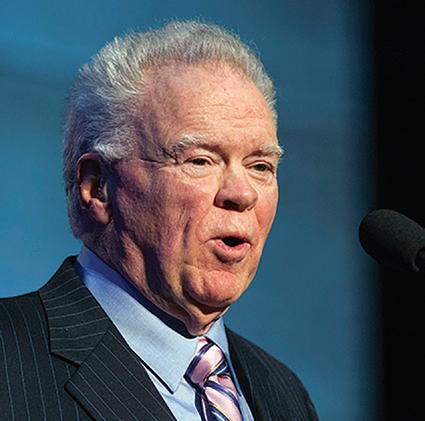
– Chicago Tribune, Christianity Today, The Christian Post, Baptist Press Get
Decatur | “When we’re discipling women, a lot of special issues get involved,” said Carmen Halsey. “Often we need a safe space to get involved and discuss it.”
Priority, IBSA’s annual conference for women, was that safe space April 27-28 in Decatur. The two-day meeting featured large-group sessions and breakouts on a variety of topics; missionary speakers; and a panel discussion that identified some of the major issues facing Christian women.
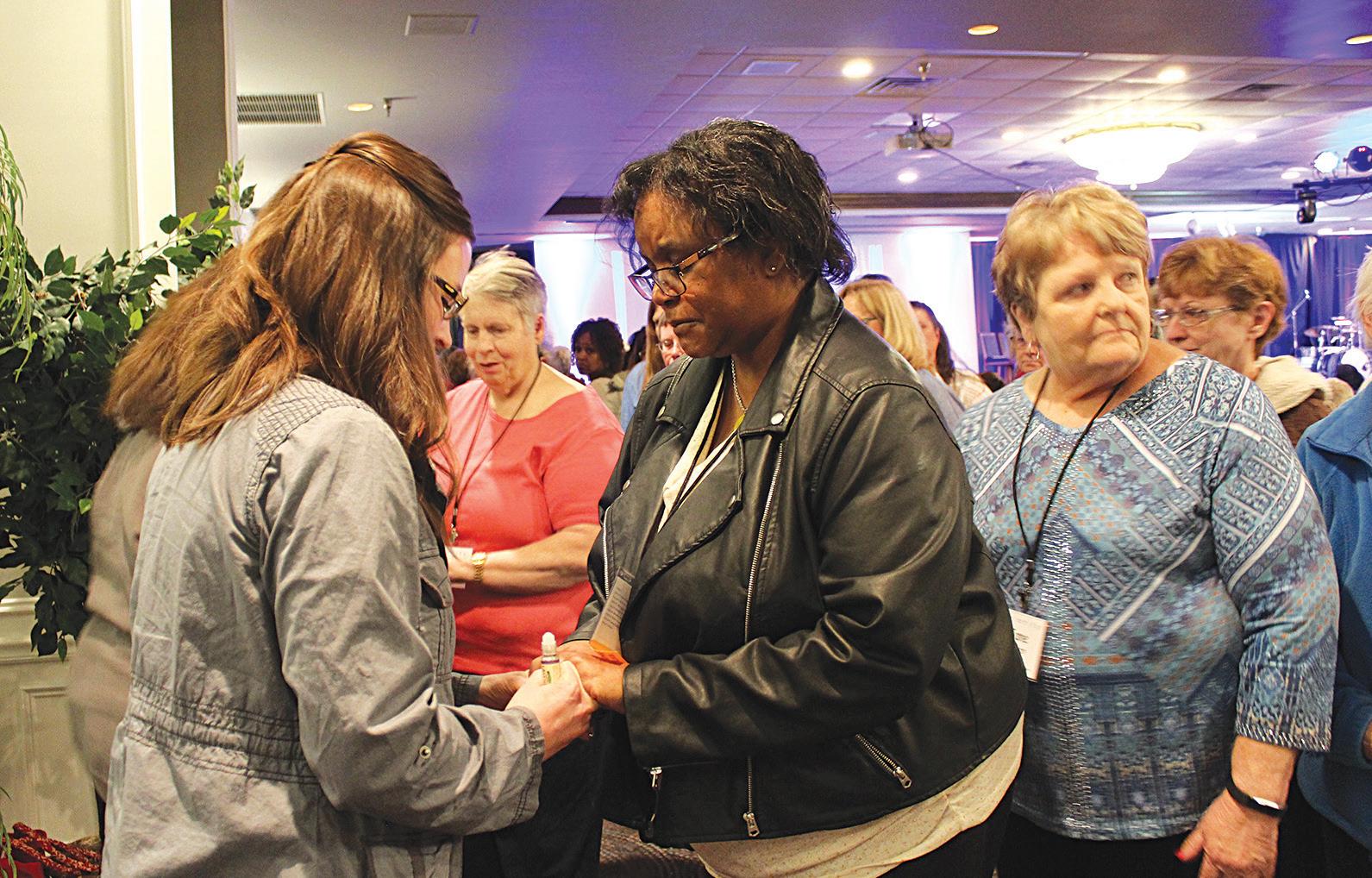
Halsey, IBSA’s director of women’s ministry and missions, led the discussion with Juli Slattery, president of Authentic Intimacy, a ministry devoted to reclaiming God’s design for intimacy; Mary Jo Sharp, assistant professor of apologetics at Houston Baptist University; and Carolyn Tatem, an author and speaker on marriage and family issues.
When Halsey asked what needs the panelists see in how churches disciple Christian women, Slattery got right to the point. “We need to disciple women in their sexuality,” she said. “I think traditionally the church has not been a safe place…I think there is a great deal that needs to be done.”
The church has ceded ground to the culture on the topic of sexuality, she said. “We have been taught traditionally that we don’t talk about sexuality in church. It may be a tradition, but it’s not biblical. LGBT, transgender—this isn’t an area to be taken, it’s an area to be reclaimed.”
Sharp addressed the topic of apologetics—defending their faith is an area of need for many women, she said. “We need to know our theology. Muslim women know their theology. Christian women don’t always know their theology and often need apologetics training.”
She lamented the lack of training for the current generation in being able to think well, and identified one benefit of knowing how to defend your faith. “Apologetics helps women answer doubt—both emotional and intellectual.”
Halsey explained why she brought these experts together to address more than 600 women gathered at Priority. “Sometimes we have to unlearn so we can learn. If there was ever a time we have to come together, it is now. We need discipleship so we won’t be scared to embrace that world.”
For Tatem, that means believing “marriages and families are perishing for lack of knowledge. I believe if we can equip people better, we can make better decisions.”
Throughout the conference, women shared how the culture has hit their families through divorce, suicide, actions of their children, and in many other ways. Halsey told the participants, “God is working here because there is persecution. A lot of culture has hit our family in the last few years.
“‘Intentionality’ was my word this year,” she continued. “This wasn’t supposed to happen to us. How am I going to live intentionally?”
Halsey told women now is the time to demonstrate their faithfulness to Christ and to consecrate themselves to him. “If you’re willing, let be this a night you say, ‘God, I’m standing so this world will see you, not me.’”
During the meeting, Priority attenders also elected officers to lead Illinois Woman’s Missionary Union (WMU), including president-elect Melissa Doyle of Chatham Baptist Church. Doyle will succeed Jill McNicol, who has led Illinois WMU as president since 2014.
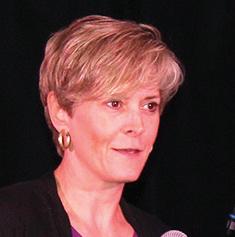
GuideStone marks 100 years as the SBC’s financial services agency
“Is our denomination dying?” LifeWay hosts Q&A on SBC’s future
Second-annual Global Hunger Relief Run raises support to address hunger needs around the world
Sending Celebration celebrates new missionaries
Frank and Sherri Pomeroy share testimonies of God’s grace after tragedy at FBC Sutherland Springs
Baptist fellowship groups meet:
• Council of Korean Southern Baptist Churches
• Fellowship of Native American Christians
• Filipino Southern Baptist Fellowship of North America
• Hispanic Baptist Pastors Alliance
• National African American Fellowship
• National Asian American Fellowship
• National Hispanic Fellowship of Southern Baptist Churches
• Southern Baptist Messianic Fellowship
For more information about the Southern Baptist Convention, Pastors’ Conference, and other meetings in Dallas, go to sbcannualmeeting.net
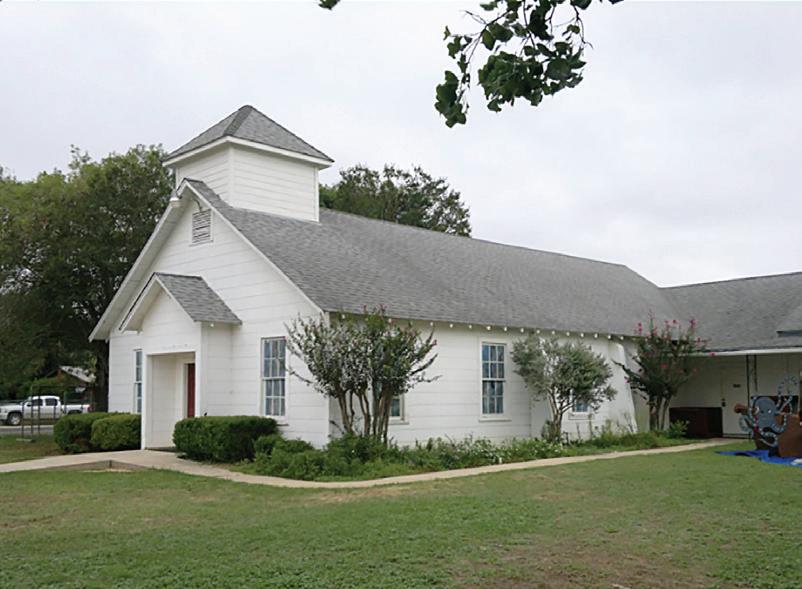
Gaines urges ‘united, civil, Spirit-filled’ dialogue at annual meeting
Dallas | With one month to go before the 2018 Southern Baptist Convention, SBC President Steve Gaines is calling Baptists to pray for the meeting, for unity, and for God’s direction in upcoming leadership decisions.
Messengers will elect a new SBC president during the June 12-13 meeting at the Kay Bailey Hutchison Convention Center in Dallas. Gaines, who will finish his second and final one-year term, noted that the candidates who have announced their intentions to be nominated appear to be “godly men” and well qualified for the post.
“J.D. Greear and Ken Hemphill are both Christ-like men who have led wonderful, evangelistic churches,” said Gaines, pastor of the Memphis-area Bellevue Baptist Church in Cordova, Tenn.
“... I urge all Southern Baptists to pray to our sovereign God,” he said, “and to ask him to have his way regarding the election for all the officers in Dallas, including who will lead us as our next president.”
In April, amid a surge in campaigning for both candidates, Greear and Hemphill issued a joint call for civility and prayer ahead of the meeting.
The rest of the SBC offices are one-candidate races so far. A.B. Vines, pastor of New Seasons Church in San Diego, will be nominated to serve as first vice president, and Felix Cabrera, pastor of Iglesia Bautista Central in Oklahoma

City, will be nominated for second vice president. John Yeats, executive director of the Missouri Baptist Convention, will be nominated for a 22nd term as recording secretary.
Praying for a ‘Harvest’
Prayer will play a major role in the meeting, as will evangelism. The theme of the meeting is “Testify! Go. Stand. Speak.”
For the second consecutive year, the Crossover evangelism outreach held prior to the annual meeting will feature a Harvest Crusade led by California pastor Greg Laurie. Crusade organizers will work with volunteers to help local churches conduct door-to-door visitation in the Dallas-Fort Worth area. They will engage residents in gospel conversations and extend personal invitations to attend the June 10 event.
Crossover is an annual evangelistic outreach effort held in the SBC host city prior to the annual meeting. The North American Mission Board, Southern Baptists of Texas Convention (SBTC), Baptist General Convention of Texas (BGCT), and local Baptist associations will help individuals and congregations connect with personal evangelism opportunities in the area as part of the Crossover outreach.
Last year’s Crossover event evangelism emphasis and Harvest America crusade yielded more than 3,500 professions of faith.
– From Baptist Press
Dallas | Two candidates have been announced to succeed Steve Gaines as SBC president. J.D. Greear, 45, has pastored The Summit Church in Raleigh-Durham in 16 years. Ken Hemphill, 70, is a former president of Southwestern Baptist Theological Seminary and now serves as special assistant to the president for denominational relations at North Greenville University.
Baptist Press requested each candidate to respond within 150 words to questions submitted by Baptist state editors and BP. Following are three of the questions and answers from the candidates; read their full Q&A’s at BPNews.net.
Q: What are some specific ways you would like to help bridge possible theological and generational differences in the SBC that Southern Baptists have expressed concerns about in recent years?
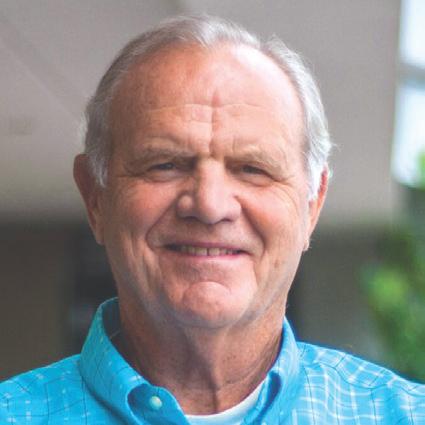
Greear: The basis of our unity in the SBC has always been the gospel and beyond that, The Baptist Faith and Message. It’s what the messengers have seen fit, under the direction of the Holy Spirit, to establish as the parameters of our cooperation.
Every word taught in Scripture is important, but we have set the BFM 2000 as the basis of our unity and I believe that should be our guide. Whenever we let secondary or tertiary doctrines, cultural customs, or worship preferences distract or divide us, the devil wins and evangelism loses.
Hemphill: In order to bridge any “potential” barriers to fellowship and mutual cooperation, we must restore trust and civility in our conversations about each other. Social media gives everyone instant access to unfettered means of sharing opinions on everything.
The internet is an effective tool of communications, but it must be self-monitored by biblical standards such as “speak the truth in love” (Eph. 4:15) and avoiding unwholesome words and speaking for edification (Eph. 4:29).
Second, we must provide opportunities for listening and discussing theological, racial, or generational differences. Local associations and state conventions can play a vital role in bringing together diverse groups of people for fellowship, respectful discussion, and prayer. We must avoid labeling faithful Southern Baptists.
Third, our structure at every level of our convention must reflect and celebrate our racial and generational diversity, while maintaining our core spiritual and theological convictions.
Q: Please describe why you believe support for the Cooperative Program, Lottie Moon Christmas Offering, and Annie Armstrong Easter Offering is vital to Southern Baptists’ mission and vision.
Greear: Cooperation between churches for the sake of mission is why the convention exists, and that cooperation has enabled Southern Baptists to produce more church planters, more missionaries, and more seminary graduates than
any other group in America. Cooperative giving through the CP, Annie Armstrong, and Lottie Moon Offerings is a powerful and proven method for supporting Great Commission work.
As a former IMB missionary and a two-time seminary graduate, I have been the beneficiary of the CP in multiple ways. In recent years our church has increasingly gotten involved in giving, and we only plan for that to continue. We want to call a new generation of Southern Baptist churches, similarly, to rise up and engage in cooperative mission and giving.
Institutions like the CP and the entities they support enable our mission efforts to have staying power, and they should be important to all Southern Baptists.
Hemphill: This is a key issue that motivated me to become a candidate.
First, establishing the budget requires cooperation at every level of SBC life. It is fine-tuned by the Executive Committee and approved by messengers at the annual convention. A church’s non-restricted gift through CP should be the norm for the sake of budgeting and planning.
Second, cooperative giving is a biblical approach to funding missions by churches who work together for Kingdom-sized goals. As a funding mechanism for supporting missions, it has absolutely no peer in Christian history.
Third, CP giving and our mission offerings allow every church of every size to be an equal partner in the ministries of the state and national convention. Percentage giving is not measured by the size of the gift but the size of the sacrifice. We must celebrate percentage giving rather than actual dollars given by a particular church.
Q: What are some lessons Southern Baptist churches in the South can learn— and possibly apply to their ministries— from congregations outside of that region in more pioneer or unreached areas of the country?
Greear: Baptisms are down in the SBC, especially in the Southeast, where the population is growing the fastest! The answer isn’t to be found in circling the wagons. It’s to remember that God founded every church with sending in mind.
Many churches in the SBC have devolved from mission outposts to maintenance facilities, and as such they have lost the presence and power of Jesus. Jesus said, “If any serves me, where I am, there he will be also” (paraphrase of John 12:26). Jesus is seeking and saving the lost. Churches in frontier regions naturally live there; all churches should return to that.
This is also where the distinction between smaller and larger churches becomes insignificant. Smaller churches often reach people in frontier areas more effectively than big ones. Most of the churches in the New Testament, for instance, were smaller, but the impact they made for the Great Commission was nothing short of miraculous.
Hemphill: I have been privileged to speak in many new-work areas and have learned far more than I have ever imparted.
First, we can learn the importance of working together on those things that facilitate gospel encounters. In this same vein, they teach us how to build relationships and share the story of Jesus with persons with little exposure to the gospel or Southern Baptists. Also, we can learn from them how to do much with so little. Few of these churches have full-time or multiple staff members and many of our smaller state conventions no longer have the equipping resources they once had, therefore they teach us to rely upon the Lord and to work with others.
Because they understand the crucial nature of working together, these new-work churches are often very generous in their cooperative giving. They teach us percentage giving has greater value than flat-lined dollar amounts.
Q: What would you suggest should be changed across the convention within the next two to three years to ensure growth?
Greear: We need (1) to focus again on the priority of the gospel as the basis of our unity and evangelism as our mission; (2) to make way for ethnic leaders to lead us in reaching a changing demographic; (3) to make it easy for churches to get involved in church planting, here and abroad; (4) to mobilize a generation of college students to live on mission, and (5) to increase involvement in the CP.

We can increase CP involvement in three ways. First, call for churches to give more to the CP. (Obvious, but bears repeating.) Second, celebrate state conventions getting money to the field. (Southern Baptists have many desires in their giving, but I believe this is dearest to their hearts.) Third, encourage all forms of Great Commission giving. We do not, of course, want to foster a societal approach, but we need to allow churches freedom in engaging.
Hemphill: Let’s be clear! The Lord builds his church (Matt. 16:18). He uses human instruments and expects all of us to engage in the singular mandate of the Great Commission—to make disciples. This requires going (evangelizing), baptizing (congregationalizing), and teaching (disciple-making). History shows that when our convention loses its laser-like focus on the Great Commission, we lose ground.
We must regain our kingdom focus. We are called to be a royal priesthood (Ex. 19:46), representing the King and advancing his kingdom to all peoples before his triumphal return. Our goal is far larger than growing our church or even our convention. We must regain the high ground of being a people on mission with God. That means that some of our personal preferences must be put aside as we renew our minds—a Kingdom mindset through churches, associations, state conventions, and SBC missions and ministries. We need to revitalize the role of state convention evangelism director, invest more in campus ministries, utilize gifted evangelists, and restore a passion for soul-winning.
– From Baptist Press
As with most things in Texas, this gathering of Southern Baptists promises to be a bit bigger than usual, both in attendance and in the scope and possible impact of the issues likely to be discussed.
Generation and direction: The two announced candidates for SBC president are markedly different, both in age and theology. While recent conventions have concluded with some attempt at conciliation and commitment to work together, this two-man race serves to highlight the differences. Its outcome will likely be interpreted as a shift in direction.
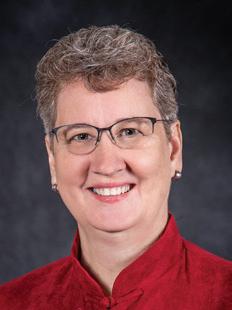
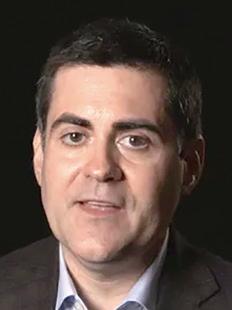
This presidential election is marked by an increase in campaigning by the candidates’ supporters. Young and Reformed J.D. Greear was the candidate who stepped aside two years ago, rather than force a second run-off election and risk deepening divisions between younger leaders beginning to take their place and their parents’ generation, and between Reformed Southern Baptists and those who would call themselves “traditionalists” on the topics of salvation and election.
The elder Ken Hemphill’s experience in a variety of SBC leadership roles positions him as a statesman candidate. A number of other SBC leaders support him as a defender of traditional theology and the Cooperative Program.
The need for assurance: Messengers will arrive in Texas feeling some fallout from Frank Page’s departure as head of the SBC Executive Committee due to personal moral failure. And David Platt announced his intention to step down as International Mission Board president earlier this spring. Both entities have search committees working to fill the vacancies.
The search for new leaders has generated conversation about diversity among denominational leadership. One pastor said it’s “imperative” that at least one of the two roles be filled by a minority candidate (see our report from MLK50 on page 10).
Diversity: The SBC’s process for nominating trustees for its entities is in the spotlight for a lack of diversity among this year’s nominees. According to the “SBC This Week” podcast, the announced group of 69 nominees to serve on SBC boards is made up of 58 men and 11 women; 67 are Anglo, one is African-American, and one is AsianAmerican.
Southeastern Seminary President Danny Akin tweeted in response to the report, “We have got to do better than this. Our trustee boards must reflect the WHOLE SBC.”
The report from the Committee on Nominations is still a work in progress (the group generally has to fill 5-10 spots that come open prior to the convention). Chairman James Freeman said the committee initiated
measures at their March meeting to increase diversity, a decision that he said was reinforced by the social media discussion.
ERLC AND social justice: Racial justice and unity may be raised again in Dallas. Throughout his tenure, ERLC President Russell Moore has galvanized younger Baptists with his brand of compassionate activism. Others, though, bristled at his harsh words for supporters of then-candidate Donald Trump, and have since questioned whether the ERLC’s policies reflect the majority of the SBC.
Last year the convention voted on a Moore-led resolution condemning “alt-right racism.” Now Moore has raised the issue of race again at an April conference that ERLC hosted commemorating the life and death of Martin Luther King, Jr. The ERLC’s report to the convention is, like last year, near the end of the meeting agenda. Moore will be among the last leaders heard from before Baptists leave Texas.
Paige Patterson: The man who led the conservative reclamation of the SBC starting in the 1970s is scheduled to preach the convention sermon in Dallas. As a traditionalist, Patterson is likely to preach on the vital importance of evangelism. He is also 75 years old; even if no announcement is made, a succession plan for Patterson as president of Southwestern Baptist Theological Seminary in Fort Worth is likely to be the topic of hallway conversation.
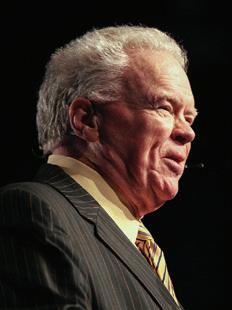
Patterson’s sermon might be overshadowed by comments he made in 2000 about domestic abuse, which recently required a statement from the seminary offering clarification 18 years later. In the comments, which resurfaced last month, Patterson said his counsel to a woman being abused by her husband would depend “on the level of abuse to some degree.” He said he never counseled divorce, and at most temporary separation.
In the wake of the #metoo movement, Patterson’s full statement is more stunning today. Fellow Texan Beth Moore, who will speak at an event for pastors’ wives in Dallas, was among the hundreds who tweeted in response, posting “We do not submit to abuse. NO.”
The cost of unity: Perhaps what will mark the Dallas convention isn’t which difficult conversations will be had, because there will certainly be some, but how we Baptists emerge from them. Will the meeting be marked by willingness to stand in unity because what unites us is the gospel? Or will our differences over the nature of gospel itself, and how God brings people to salvation, make the divide, largely generational, even clearer and wider?
Following the election of H.B. Charles as the first African American president of the SBC Pastors’ Conference, diversity has been among the anticipated emphases at this year’s conference.
But Charles says diversity, while important, will be a secondary focus as pastors gather June 10-11 in Dallas. When selecting speakers to invite, faithfulness in the pastorate was his primary criterion, in keeping with the conference’s “Fulfill Your Ministry!” theme, drawn from 2 Timothy 4:5.
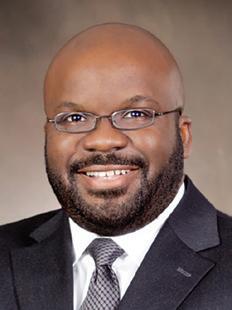
The racial and age diversity of the speakers represents that “God uses different persons, different personalities and different backgrounds,” said Charles, pastor of Shiloh Metropolitan Baptist Church in Jacksonville, Fla.
Yet “my first concern was that these men I’ve invited are faithful preachers,” Charles said, “and that these are men who represent what 2 Timothy 2:15 says: that they rightly handle the Word of Truth.”
“Unshakable Pursuit” is the theme for two days of general sessions, conferences, and missions experiences during WMU’s Missions Celebration and Annual Meeting, June 10–11.
“We believe you will laugh, learn, and experience nourishment for your soul,” said Sandy WisdomMartin, executive director-treasurer of National WMU and an Illinois native. “As you are captivated by the stories of God’s work in the world, you will be drawn closer to his side and renew your commitment to his mission.”
Kempton and Caryn Turner, church planters in East St. Louis, are among the featured speakers.
The annual luncheon and conference for ministers’ wives will center on the theme “Restored,” based on Psalm 23:3: “He restores my soul; He guides me in the paths of righteousness for his name’s sake.”
Author Lisa Harper will keynote the luncheon June 12. She will also speak at a morning conference June 11, where she will be joined by Bible study leader Beth Moore and Sherri Pomeroy of First Baptist, Sutherland Springs.
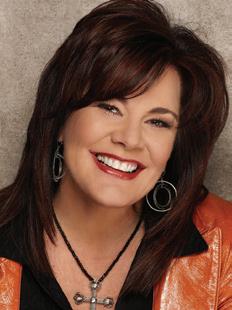
The “Restored” theme represents “a timely heartfelt desire, as we recall the many disasters of 2017,” said Liz Luter, luncheon president, pointing to the many hurricanes, fires, floods, and violent shootings.
Luter acknowledged many pastors’ wives serve as the hands and feet of Jesus “to lift the bowed-down heads.” The luncheon is meant to celebrate those “who were so instrumental in helping the boweddown heads...whose acts of love [helped] restore the hearts and dispositions of those who suffered great adversities this year.”
– From Baptist Press


Fifty years after Martin Luther King’s death, racial unity is more dream than reality in America. But what about the church?
BY MEREDITH FLYNNIn 1968, striking sanitation workers carried signs in Memphis proclaiming “I Am A Man.” They marched to protest working conditions that had recently left two of their own dead. It was their protest that brought Martin Luther King, Jr. to Memphis, and to the Lorraine Motel, where he was asassinated.
Fifty years later, people convened at the site to see what has happened with civil rights, and nearby, Southern Baptist leaders questioned the state of race relations and unity in the church. About 4,000 people met at the city’s convention center for MLK50, a conference on race and the church, co-sponsored by the SBC’s Ethics and Religious Liberty Commission.
The meeting featured a diverse group of speakers on an even broader list of topics: race and politics, systemic injustice, coming to terms with the past—and present. In their messages was this plea: Churches can no longer be silent on the issue of racial justice.
“We have expected you to be our greatest allies in the struggle against injustice,” Chicago pastor Charlie Dates told fellow pastors. “And we wanted you to shout it from your pulpits.”
In a letter written from jail in Birmingham, Ala., in 1963, Dr. King expressed similar disappointment with white ministers who were either opposed to the Civil Rights movement or cautious about getting too involved. King’s words for the latter are hard to read— they “have remained silent behind the anesthetizing security of stained glass windows,” he wrote.
“Often, we can fool ourselves into believing that somehow history itself will take care of problems of racial injustice,” said Russell Moore, president of the ERLC. “That somehow inevitably, these things will work themselves out.”
But they haven’t. Racially motivated violence took the lives of nine members of a black church in Charleston, S.C., in 2015. White supremacists marched in Virginia and elsewhere, just last year. While most people don’t use racial slurs or march behind the Confederate flag, Moore said, we still retreat to the places and mindsets where we’re most comfortable.
All the while, the church has the solution: the power of the gospel to redeem sinners, and to transform
The image of God
Personhood and justice were the themes of a 1968 sanitation workers’ strike memorialized today by a mural in Memphis. Managing editor Meredith Flynn returned home to Memphis to learn what has developed in racial equality and unity, as the city observed the 50th anniversary of the death of Martin Luther King, Jr.
Page 11: Chicago pastors Bryan Price and Nathan Carter on what will unify the church
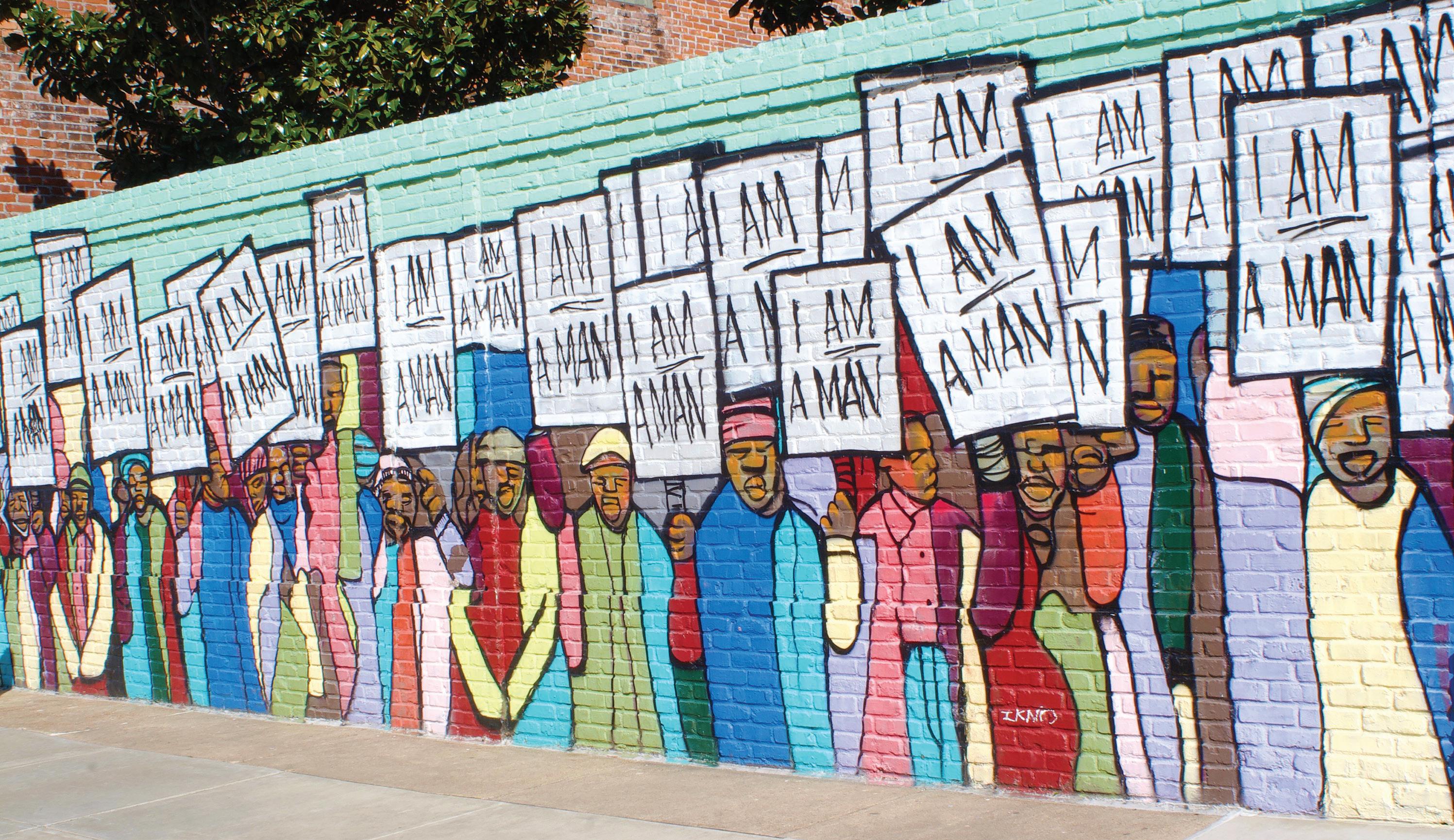
brokenness. Speakers on the MLK50 stage implored pastors and Christians to work toward a radical view of unity—one that lays down personal preference and seeks to understand others, for the glory of God and for the sake of the gospel.
It starts with courageous leaders, said Kevin Smith, executive director for the Baptist Convention of Maryland/Delaware. “Nothing changes about the church in America without the pulpit changing.”
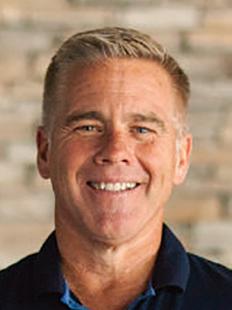
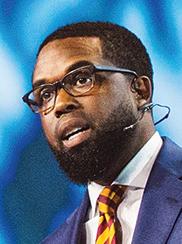
To grow up in Memphis is to be well acquainted with Dr. King and Rosa Parks and the Freedom Riders. The Lorraine Motel is a city landmark, and when the museum opened downtown in the mid90’s, school groups started taking field trips there. Still, in a city so closely entwined with the Civil Rights movement, it’s surprisingly easy to grow up holding history at arm’s length.
On April 4 of this year, attenders at the MLK50 conference took a break to join the city’s celebration of Dr. King. At the motel, the courtyard and parking lot under the balcony where he was shot were cordoned off. Folding chairs were set up for guests invited to attend the ceremony in his honor. Other visitors to the site stood well behind them, at the top of a small hill overlooking the hotel.
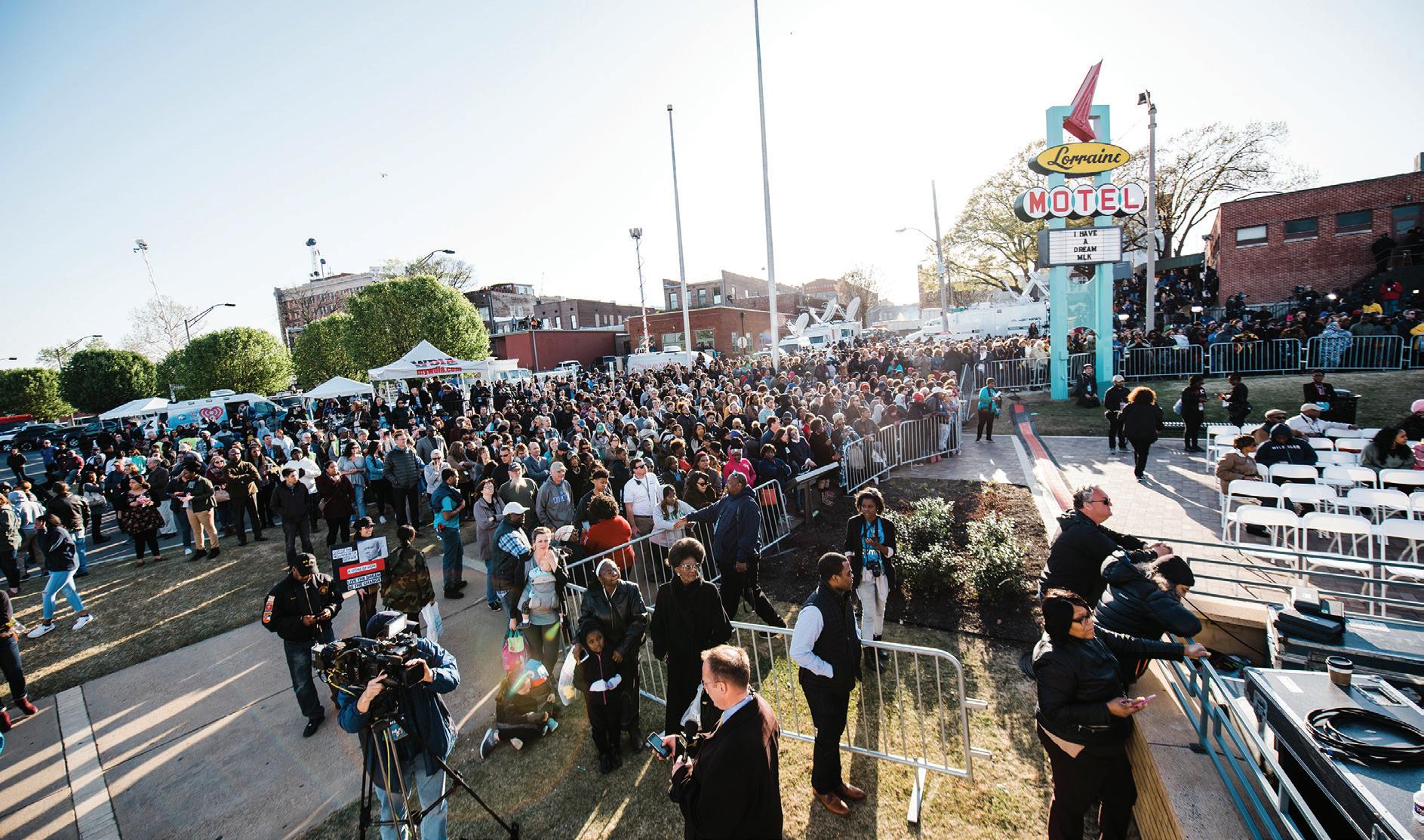
Down the street, pop-up booths sold T-shirts and other memorabilia. Upbeat music poured out of an open shop door. At 6:01 p.m., the festivities stopped for a moment of silence in observance of King’s death. What resounded at the event, over the beat of reggae music and over the momentary silence, was an invitation to lean in and learn.
The same was true at the conference. A Southern Baptist pastor crystallized a call to action for the denomination: “Every time there’s an opportunity to drive a nail in the coffin of racism, every white Southern Baptist should be very quick to grab the hammer,” said Vance Pitman, pastor of Hope Church in Las Vegas. He was one of four Baptist leaders who took part in a panel discussion on the SBC and race, a session that started with a look at the denomination’s historical struggle to overcome prejudice and discrimination.
This is an ongoing struggle. In 1995, Baptists approved a resolution repenting of racism and asking African-Americans for forgiveness. In 2016, messengers repudiated the Confederate flag, and in two emotional sessions last year, messengers resoundingly approved another resolution condemning “alt-right” racism.
“It’s something that we’re going to have to constantly—as a convention, as a denomination— deal with and address as we move forward to continue to work towards the kind of reconciliation that we need to see happen,” Pitman said.
The panel, which also included Kevin Smith, National African American Fellowship President Byron Day, and Iowa pastor Jeff Dodge, discussed
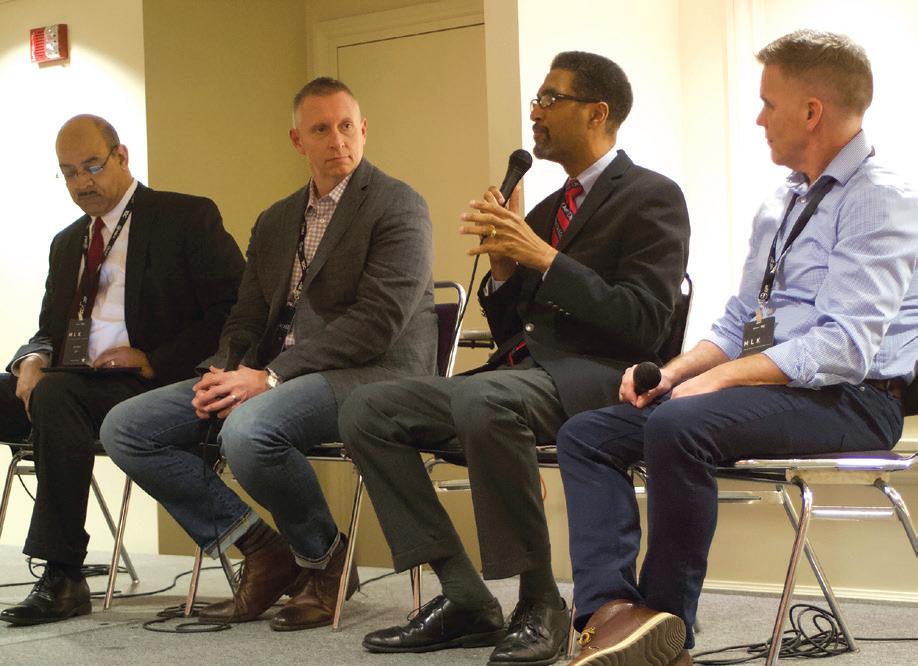
the “missiological consequences” of not pursuing racial unity, as well as the value of individual relationships across racial boundaries. When the conversation eventually turned to leadership of SBC entities, Pitman said it is “imperative” that at least one of two vacant posts—president/CEO of the Executive Committee and president of the International Mission Board—be filled with minority leadership.
Representation and leadership are key issues on the local church level as well, said Randle Bishop, an elder of Immanuel Baptist Church in Chicago, who attended the MLK50 conference. “One area that lacks unity in our churches and other Christian ministries is the glaring lack of submission to minority leadership,” Bishop told the Illinois Baptist.
“The reason for this is surely complex,” Bishop said. “However, if whites were to join biblicallyfaithful black and Hispanic churches and Christian ministries, this could be an additional approach to advancing greater unity in the body of Christ.”
Many of the addresses given in Memphis had at their root the Bible’s words about unity among Christ-followers. They called racism by its name— sin—and described its effect on American society and the church. “Namely,” said Bishop, referencing Genesis 1:27, “sin has deeply affected the way we relate to one another as image-bearers.”
“One takeaway for me was seeing how clearly the Bible addresses the hypocrisy of those who sinfully act out in racism towards other people. We do not have to take our cues in this conversation from the world and we must not,” Bishop said. “Jesus has clearly spoken in his word. He has said, ‘Love your neighbor as yourself.’”
Throughout the conference, speakers made it apparent that how to go about loving your neighbor as yourself, especially in the realms of racial identity and justice, is an exceedingly complex matter. But, they seemed to say, it starts with humility, and a willingness to set aside personal preferences in order to pick up unfamiliar burdens.
“We’re free to love each other,” Moore said. “Free to listen to each other. Free to be led by one another. Free to serve one another. We’re free to be the church of Jesus Christ. And if we have to change our worship styles, let’s crucify our worship styles. If God’s way upsets our political alliances, let’s crucify our political alliances.
“To be a gospel people means that we don’t seek a cheap reconciliation, but a cross reconciliation.”

“We should care because God cares. We should care about this not because it’s trendy, but because God does. And when we have a true picture of God’s priorities, it’s going to point us to the right kind of compassion.”
– Trip Lee, author, teacher, hip-hop artist“Families broken by systems, vulnerable populations made at risk by systems of injustice, and broken communities made almost hopeless by achievement gaps and wealth disparities— they all need to see a church, a church that demonstrates how right doctrine functions outside the walls of a church.”
“We have to anchor our people in the Bible so that they don’t just jump off this bandwagon, onto the next bandwagon, to the next bandwagon, whatever is kind of floating around in the fad world….The impulse we have to jump into this race issue is because of Jesus Christ, it’s because of the gospel, it’s because of the truth of the Bible.”

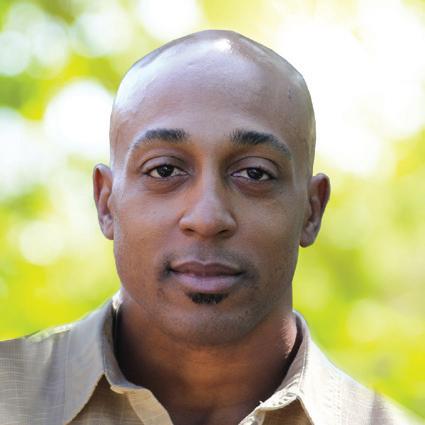
When it comes to racial unity in the Christian church, are we there yet? Is it even possible? The short answer to the first question is no, but to the second, the answer is yes—with ongoing effort.
First, we must apply the gospel to the issue. In Scripture, we find calls to humility, patience, love, forgiveness, and a host of other critical virtues (Eph. 4:2, Col. 3:12, Gal 5:22-23). The gospel also celebrates the gift of diversity and recognizes that different does not mean deficient (I Cor. 12). When Paul declared there is neither Jew nor Greek (Gal. 3:28), he did not mean that suddenly all cultural and ethnic differences disappear and that everyone is the same. Rather, in Christ we are all equal, despite our differences.
When we consider racial unity in the church, we must ask ourselves how we are defining it. Does unity mean more multicultural churches? More churches with an even mix of white and black people? Or, is racial unity best exhibited on a denomi-
process, but the outcome would be fruitful and God-honoring.
In primarily white denominations, rather than sponsoring more African American church plants, or church plants with white pastors trying to reach black communities, what if white churches merged with black churches and then worshiped and served like everyone else? Not necessarily as the pastor, elder, or deacon; not overseeing the finances; but simply serving within a body of believers. It may seem farfetched, but I think for some, it would be a good start.
History is filled with examples of churches, denominations, schools, even entire towns, founded because white people excluded black people from their institutions. Fast forward to the present, when many white people are genuine in their desire to make things right. However, it sometimes feels the expectation is that people of color forget what happened and ignore how we got to this point in the first place.
The fact is, the scars are deep, and the impact of the past is immense. Just because one party suddenly begins to see the error of their ways does not mean everyone else can jump on the reconciliation train with ease.
Iheard an interview recently with acclaimed author Jan Morris. In it, Morris talked about being on a quest for unity and reconciliation. I listened on with interest.
Jan Morris used to publish under the name James Morris, that is, before a gender reassignment surgery in 1972. Having lived as a man and now as a woman, Morris prefers transcending both sexes instead of being part of just one, and recommends the advantages of androgyny.
As Christians, we share the noble urge for unity and reconciliation. Yet we find Morris’ approach sadly misguided. We understand that “God created man in his own image, in the image of God he created him [singular]; male and female he created them [plural]” (Genesis 1:27). The designed unity of the human race was not contradicted by the diversity of the sexes. The creation of distinct men and women was, in fact, very good. Disunity only came at the Fall with the entrance of sin, idolatry, and confusion.
someone is in Christ. Rather, these various demographics are reconciled through Christ. The Body of Christ is more beautiful because not everything is bulldozed. The wall of hostility? Yes! But not the basic marks of differentiation.
Yet, when issues of race are brought up today, some (usually white) Christians will say with frustration, “If there is neither Jew nor Greek, then why are we still making a big deal about black and white?” This is like asking, “Why are we still noticing if a person is a man or a woman?”
Just as androgyny is not the way to biblical unity, neither is colorblindness. And sometimes our attempts at racial unity are the equivalent of asking people to have sex-change operations—expecting black people to change who they are and conform to the majority culture, or making white people feel ashamed of the good or neutral aspects of their cultures.
national or associational level, where there is unity in partnership and strategic decision-making at every level, while locally, churches maintain their own geographical, cultural, and ethnic distinctions?
With great sacrifice, I suppose there is a better chance for the latter. To have true racial unity in primarily white Christian denominations, those in positions of power must be willing to surrender their power. Here is why: To allow a person of color to have a leadership role is an assertion of power in and of itself, one that some might perceive as racist.
Giving you the ball if I own the court is not a big deal. To create an environment of mutual respect and true equality, we must both own equal portions of the court so that no game can commence unless all parties agree to the rules. This can be a long, arduous
As a pastor, I have sat in front of couples where there had been infidelity in the marriage. In some instances, the injured party was willing to forgive and work towards reconciliation, but the process took years, and there were periods of mistrust, relived pain, and lots of honest and sometimes heated discussion before things got better. At times, the perpetrator had no choice but to bear it. Yet, in those cases where the couple was committed to reconciliation, the relationship was stronger in the end.
I think the Christian church can have this same outcome, and I believe strongly that the Christian church should see it as her responsibility to work to this end, for the sake of a strong gospel witness to the world.
Bryan Price pastors Love Fellowship Baptist Church in Romeoville. Read a longer version of this column at IllinoisBaptist. org/reconciliation.
We also know that in Christ, God is creating a new humanity out of the wreckage of the Fall. Here we are told “there is neither Jew nor Greek, there is neither slave nor free, there is neither male nor female, for you are all one in Christ Jesus” (Gal. 3:28). But we do not read this verse as advocating androgyny.
To be in Christ, one does not have to cease to be decidedly male or female or find some way to transcend both in pursuit of unity. Rather, each person brings his or her created and redeemed maleness or femaleness into the community and uses it to glorify God and serve others. Gender is still there, but it is not an identity that puts us at odds with the opposite sex.
What does this have to do with racial reconciliation in the church? Consider the other categories in Galatians 3:28. Racial/ cultural and social/economic distinctions are less fixed and more fluid. For example, ethnic markers can morph over time, and one’s social station can shift. But recognizing these realities is not inherently wrong. Neither are they radically removed when
Acknowledge distinctions, and repent of the ways we have dismissed or minimized the experiences of others.
Black and white (along with other distinctions) must be acknowledged in the church. We need to repent of ways that we have dismissed or minimized others’ individual or collective experiences. Instead we must love those who are different from us, listen to their stories, lament with those who lament, and learn to celebrate the best of different cultures. Not merely for the sake of diversity, but in a shared pursuit of the glory of Christ, who is “all, and in all” (Colossians 3:11). Until we can do this more, Sunday morning at 11:00 will remain the most segregated hour in America.
Nathan Carter pastors Immanuel Baptist Church in Chicago.
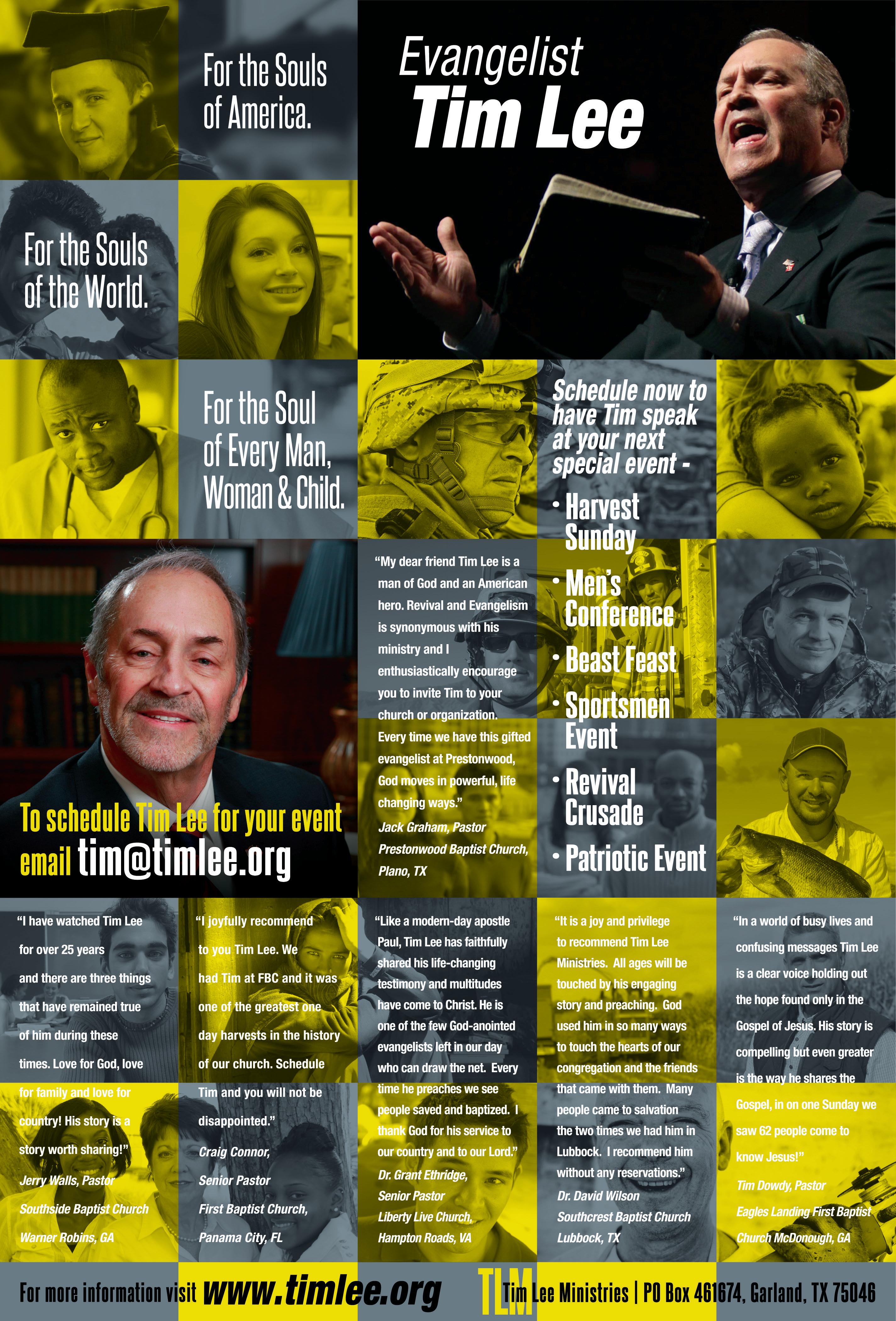
We don’t actually know a whole lot about one of the most famous mothers in history, Mary, mother of Jesus. But in spite of being unsure of her thoughts on today’s hot button child-rearing topics, we can still gain helpful parenting advice from studying Luke’s account of Jesus’ early childhood.
1. Mary was a willing mother. She didn’t have to sweat waiting for 60 seconds and the tiny plus sign on a home pregnancy test; instead, an angel appeared to tell Mary the impossible was about to happen (Luke 1:35). Mary, who could not have fully grasped the gravity of the situation, immediately responded with “Behold, I am the servant of the Lord; let it be to me according to your word” (1:38).
An angel of the Lord had just delivered news that was about to wreck Mary’s dating relationship, reputation, and future, but yet she took her call of motherhood with a servant’s heart.
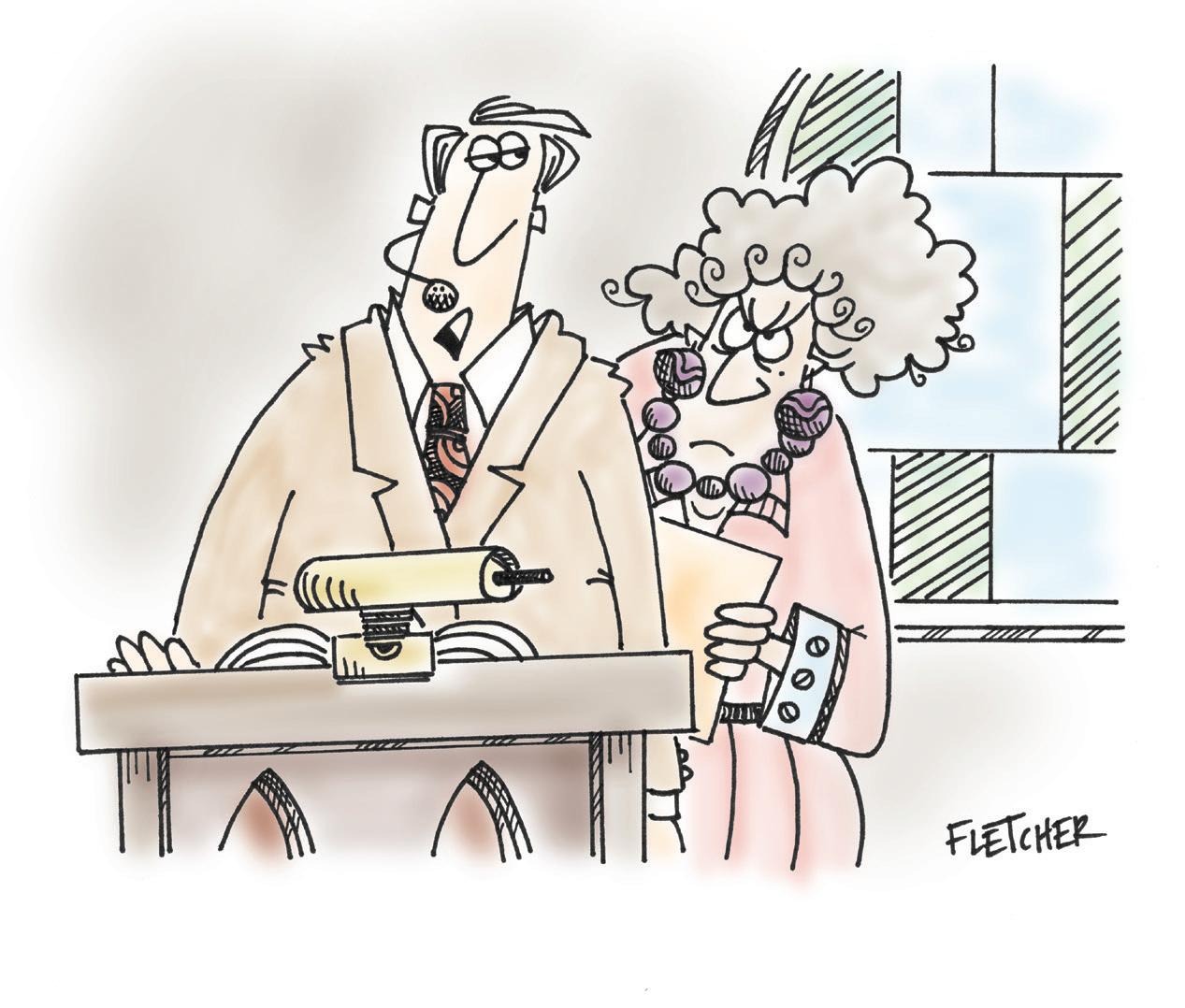
I wish I could always say the same. Two of my four sons are internationally adopted. We saw incomplete files of their special needs and diagnoses before they came home. As I’ve walked the road of parenting them, there are days when new diagnoses or the ramifications of their trauma seem too much.

I get mad at their former abusers, their birth parents, and their medical circumstances. My heart isn’t willing to serve God by being their mother; my heart just wants it all to be easy.
God, let me be a willing servant, even without knowing or understanding all that lies before my children.
2. Mary was a reflective mother. One of the facts most people know about Mary is found in Luke 2:19: “But Mary treasured up all these things, pondering them in her heart.”
The woman had just birthed a baby on the floor of a barn. She had no epidural, no midwife, no birthing tub. She delivered that baby next to a few stinky animals after a long, exhausting journey.
She deserved to follow this modern advice: Sleep when the baby sleeps. But Scripture tells us she took time to reflect on what was happening.
I am just a couple months away from delivering my second biological child. I’m already having all the flashbacks of sleepless nights and helpless moments as my newborn acclimates to the world. I remember the state of ex-
haustion that comes with the first days of welcoming a new child.
I don’t know that any of my visiting friends will be able to describe me as one who is “pondering” or “treasuring” during those early days. But Mary intentionally captured the memories of strangers (smelly shepherds) as they bent their knees and worshipped their king (2:16).
In the thick of the busy, the crazy, the out-of-control, I want to steal away a few moments to stop, ponder, reflect, and treasure. God, you have given me children. Let my heart not forget the gravity of this task. Let it treasure the precious moments.
3. Mary dedicated her child to God. There are days when the weight of four little worlds seemingly rest upon my shoulders. Do my sons watch too much TV? Will they miss out if I don’t enroll them in this sport or these lessons? Have I completely ruined them by not forcing them to eat more vegetables?
Modern motherhood causes much anxiety and worry as our children are presented with so many options and opportunities. Studies prove and disprove we are ruining or enriching our children, depending on the specifics of how we are raising them.
It’s exhausting. And I’m not raising the Savior of the world.
But Mary followed so many mothers before her while simultaneously setting an example for those of us who were to come after—she dedicated her sweet boy’s life to the Lord (2:22). She promised to raise him according to God’s law, among his people, and within his teachings. She simply, obediently, faithfully, trustingly gave her firstborn son over to the will of the Father. She promised to raise her son to the glory of God.
I limit my kids’ involvement in extracurricular activities, while certainly allowing too much screen time. Some of my best friends could not have raised their children in a more opposite fashion, but if we all miss raising our children for God’s glory, we’ve each missed the purpose of motherhood.
Mary was willing and reflective. Most importantly though, she knew her role of motherhood required dedicating her baby boy to God’s purpose and glory. She raised him for the Father. God, let me learn from Mary as I dedicate my children to bringing you glory. Let me raise my kids for you.
Ginger Newingham is the mother of three sons, and is expecting a fourth this summer. She is a member of Delta Church in Springfield.
devotional
Read: John 1:40–41: “One of the two who heard John speak and followed Jesus was Andrew, Simon Peter’s brother. He first found his own brother Simon and said to him, ‘We have found the Messiah’ (which means Christ).”
I recently returned from a mission trip to Salvador, Brazil, where our mission team had the opportunity to assist a local pastor in daily door-to-door evangelism. One day we shared the gospel with a young lady, who after hearing the good news of Jesus Christ accepted him as Lord and Savior and immediately said, “We must go tell my brother.” The woman was so excited about her salvation that she wanted her brother to share the same experience. So, we went next door and she told her brother what happened to her and then asked him to listen to what we had to say.
I was reminded of Andrew’s experience in John 1 and this truth: People who have met the living Savior and experienced his salvation always go and tell others about Jesus!
Andrew had not been following Jesus for long—he did not know everything he needed to know about Jesus, but he knew Jesus was the Messiah—so he immediately testified to his brother.
Like Andrew, and like the young lady in Brazil, we don’t have to know everything about Jesus to share the good news with others. All we have to do is testify about what he has done in our lives. Christ’s followers are all commanded to be witnesses for Jesus (Acts 1:8).
So Andrew goes and tells his brother Simon, “We have found the Messiah!” The word for “found” in the text means to discover joyously something you have searched for diligently. After finding what their souls sought, neither Andrew nor the young Brazilian woman could keep it to themselves.
PRAYER PROMPT: Lord, you have saved us and sent us back into the world to be your witnesses. Empower us by your Spirit to share our testimony and tell the world the difference you have made in our lives.
Adron Robinson is pastor of Hillcrest Baptist Church in Country Club Hills and president of the Illinois Baptist State Association.
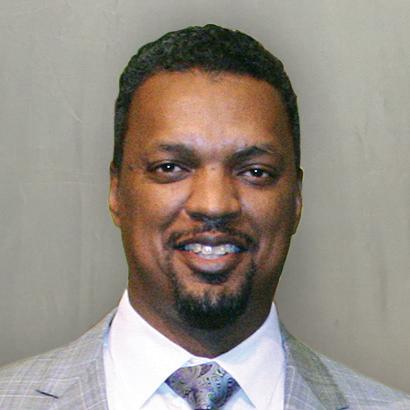
She was willing and reflective. She dedicated her son’s life to God.
What mothers (and others) learn from Mary
Our church increased Cooperative Program giving by one percent of our undesignated receipts each of the last two years. Now a small, but vocal group wants to give a similar amount to a pet missions project. That wasn’t the purpose of the 1% challenge at all.
June 2
Missions Spectacular
What: Hands-on mission projects for the whole family
Where: Gateway Association and Christian Activity Center Info: DwayneDoyle@IBSA.org
IBSA Up Summer Camps
June 4-8: Grades 3-12, Streator
June 18-23
Illinois Changers
What: Students in grades 6-12 tackle construction projects and engage in evangelistic outreach
Where: East Peoria Register: IBSA.org/Students
June 24-28
July 6-10
Chicago Mission Trip
What: Serve alongside leaders from Uptown Baptist Church on various ministry projects in their community
Info: IBSA.org/Missions
July 9-13
Summer Worship University
June 11-15: Grades 3-6, Streator
June 17-21: Grades 3-6, Lake Sallateeska
June 25-29: Grades 3-6, Lake Sallateeska
July 9-13: Grades 3-12, Streator
July 16-20: Grades 3-12, Streator Register: IBSA.org/Kids
June 10-13
Southern Baptist Convention and Pastors’ Conference
Info: sbcannualmeeting.net
WellHouse Mission Trip
What: Mission team will serve at a Birmingham, Ala., facility for women coming out a life of exploitation Info: IBSA.org/Missions
June 25-29
Elevate Camp
Who: Students who have completed grades 7-12
Where: Lake Sallateeska Baptist Camp Register: IBSA.org/Students
June 26-30
PAT PAJAKI celebrate your church’s willingness to increase its mission giving by 1% per year, and I agree that designating that percentage to a favorite project only defeats the purpose of the increased giving. Maybe you should consider introducing (or reintroducing) your church to the vital work of the Cooperative Program. Through CP, your church is joining together with 44,000 other SBC churches to make a genuine impact on the entire world. It’s important not to lose sight of that fact. Independent missions giving takes away from the collective impact of reaching the world for Christ through the Cooperative Program. Go to CPmissions.net for resources, or contact IBSA at (217) 391-3119.
QA pastor-friend of mine calls once a year and asks, “What’s working?” I think he wants a magic bullet for ministry. Well, Pat, what’s working?
ASorry, there is no magic bullet! Touching your community for Christ requires being willing to build relationships, have gospel conversations, invite friends and neighbors, live a life that demonstrates the change God brings to those who trust him, and pray for the Holy Spirit to work in a supernatural way. In other words, church work is hard work.
Sharing the good news of salvation still works, preaching the truth of God’s Word still works, serving your community still works, planting a new church to reach people still works, supporting missions still works… but notice, things that work take WORK!
Pat Pajak is IBSA’s associate executive director for evangelism. Send questions for Pat to Illinois Baptist@IBSA.org.
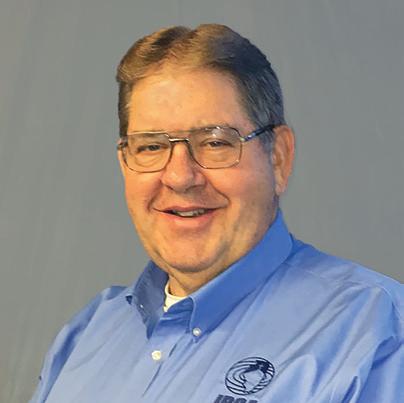
June 15-16
Father/Son Overnight
What: Camp for fathers, sons, grandsons, grandfathers, and mentors of all ages Where: Lake Sallateeska and Streator Register: IBSA.org/Kids
Find more information on ministry positions at IBSA.org/connect
Send NetworkiNg items to IllinoisBaptist@IBSA.org
Nine Mile Baptist Association is prayerfully seeking an associational missionary (Director of Missions) to serve God through serving and leading our association. Resumes will be received through May 31. Please send to Mark Lee, Search Committee Chairman, at markdlee@frontier.com.
Northside Baptist Church in Dixon is seeking a bivocational minister of music. We are seeking a passionate, creative, and humble leader who can guide our ministry into the future. Northside Baptist is a progressive Southern Baptist church that desires to reach our community and the world for the cause of Christ. To submit a resume, or for a complete role description along with salary considerations and employment policies, contact Pastor Dan Bentz at dan@northsidedixon.com. Check out our website at northsidedixon. com.
Super Summer
What: Training week for students who have committed their lives to Christ Where: Greenville College, Greenville, Ill. Register: IBSA.org/Students
What: IBSA’s premier worship, music, and arts event for students in grades 6-12
Where: Hannibal-LaGrange University, Hannibal, Mo. Register: IBSA.org/Students
July 15-20
Fused Camp
Who: Students entering grades 6-12
Where: Lake Sallateeska Baptist Camp Register: IBSA.org/Students
July 20-28
Germany/U.K. Vision Trip
What: Team will be introduced to the work of IMB missionaries serving among South Asian peoples in Frankfurt and London Info: IBSA.org/Missions
STAY WHERE YOU ARE. SERVE WHERE YOU’VE BEEN CALLED.
STUDY WITH WORLD-CLASS FACULTY AND A GLOBAL STUDENT BODY.
Learn more about our 100% online degrees at tiu.edu/online

QI bring home $4,100 a month in military disability pay and Social Security combined. My wife brings home an additional $2,000 each month. Should we base our emergency fund level on her income only, since mine is guaranteed?
AYour emergency fund shouldn’t be based on income. I recommend folks have three to six months of household expenses set aside in an emergency fund. What would it take to operate your household for that length of time if one or both of your incomes disappeared?
I don’t anticipate your income stopping. But income loss isn’t the only thing you’re guarding against with an emergency fund. You’re also guarding against things like an illness in the family, if the transmission in the car goes out, or your home’s heating and cooling
DAVE RAMSEY
unit needs to be replaced. There are many more crises that can come upon a family other than a loss of income.
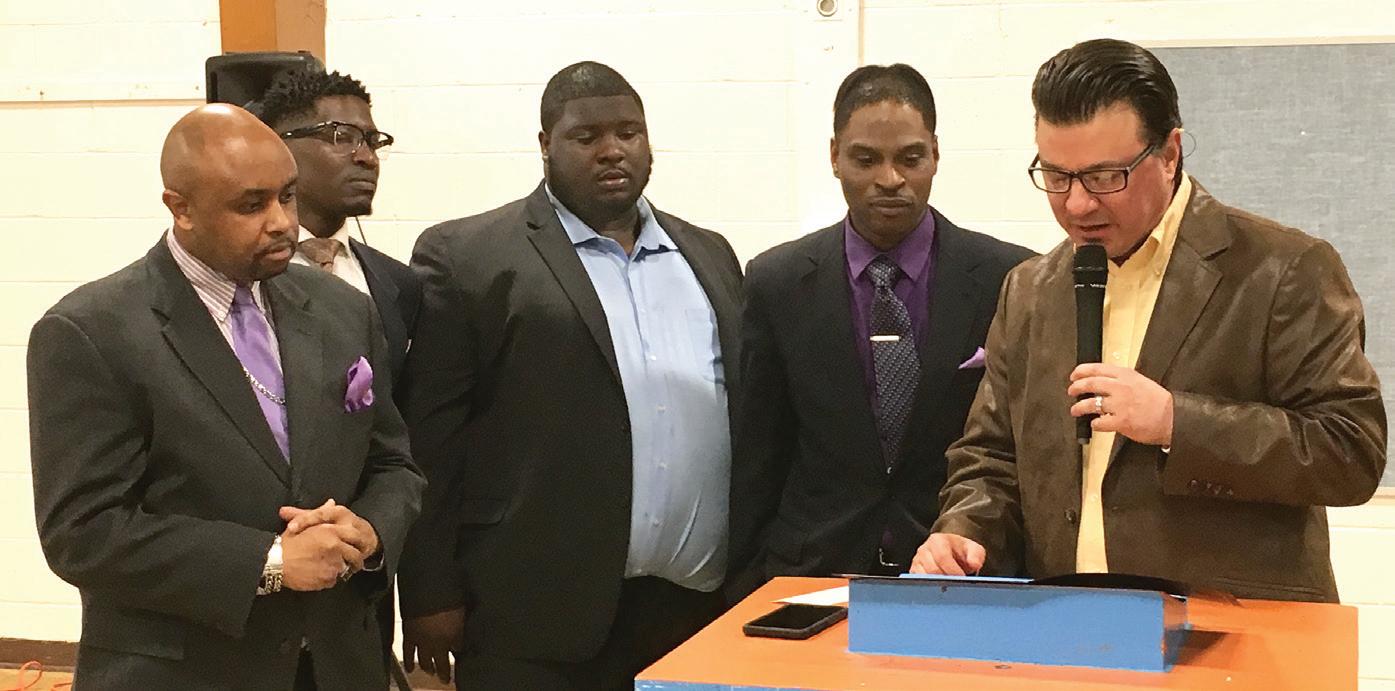

I don’t mind if you two lean toward the three-month side of expenses, since your income is pretty stable. But always remember, an emergency fund should contain three to six months of expenses, not income.
Thank you for your service, sir.
That ’s the question voters will be asked to decide on the November 6th ballot.
Here’s what Chicago lawmakers don’t want you to know. In 2013, they legalized “medical” marijuana, ignoring the warnings and concerns from medical groups. In 2016, they decriminalized it to a mere $100 fine, plus records for possession are expunged every July 1st and January 1st

Colorado legalized marijuana in 2013.
What ’s happened there is tragic:
Youth (12-17) now rank #1 in the nation for “past month use” and 55% higher than the national average
A 66% increase in pot-related deaths
A 72% increase in pot-related hospitalizations;
a 147% increase in Poison Center calls

A 268% increase in marijuana-related exposures for children ages 0-5
In Denver County, there are more pot stores than Starbucks, McDonald’s and Walmart’s combined by double
Nearing bankruptcy, lawmakers are looking for a new source of tax revenue to cover their years of reckless spending. But at what cost? Colorado’s revenue is a mere 0.8% of their budget. The negative consequences to families can’t be measured.
Larry Shacklee is the new pastor of First Baptist Church, Zeigler. He has pastored since 1958, serving 50 of those years with Illinois churches and ministries. Shacklee, who is married to Jane, pastored in Anna, Carbondale, Steeleville, DuQuoin, and Ava, and served 10 years as IBSA’s campus minister at Southern Illinois University in Carbondale. Most recently, he spent 15 years as minister of education and administration at Third Baptist Church in Marion.
David Clay was ordained at West Gate Baptist Church in Trenton on March 11. Clay, who joined the West Gate staff in 2015 as associate pastor of youth, is a graduate of Union University in Jackson, Tenn., and Southern Baptist Theological Seminary in Louisville, Ky. He is married to Rachel, and they have a daughter, Eliana.

Location: Wilder Haven (East Decatur)
Focus: Senior adults and single-parent families
Characteristics: This mobile home community on the east side of Decatur in central Illinois is home to many elderly residents and single mothers.
Prayer needs: We need churches that will adopt this community as their mission field. The Wilder Haven community building has been made available for Bible studies. Over 90% of the people living inside mobile home parks never leave their park to go to church – IBSA
187,000 students
Snapshots from the world of Illinois Baptists
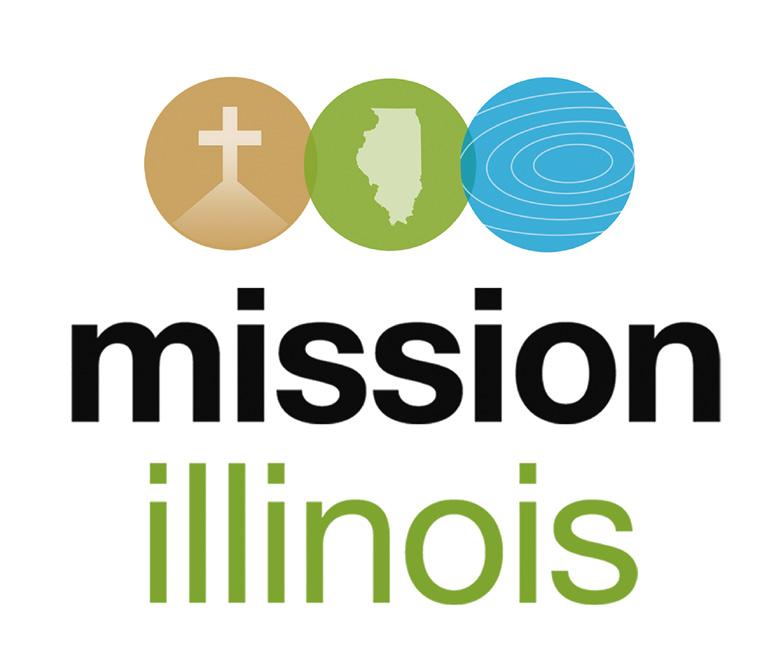
The Great Commission?
More than half of churchgoers say they’re unfamiliar with the term given to Matthew 28:18-20.
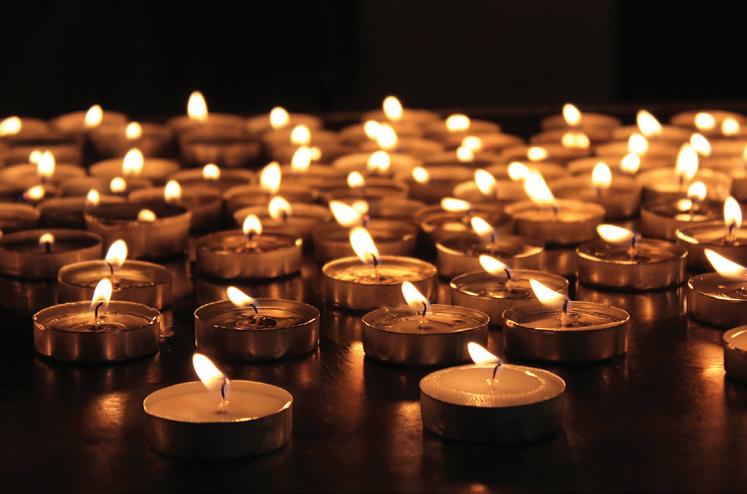
Have you heard of the Great Commission?
have experienced a shooting on 170 school campuses since the Columbine High School shooting in 1999.
Yes, but I can’t recall the exact meaning
Yes, and it means... Not sure
“The data indicates that churches are using the phrase less,” reports Barna Research, “which may reveal a lack of prioritizing or focusing on the work of the Great Commission, but may also indicate that the phrase, rather than the scriptures or the labor, has simply fallen out of favor with some.”

–

When he walked into Graham Correctional Institute for the first time eight years ago, Rob Cleeton didn’t expect to engage in longterm ministry.
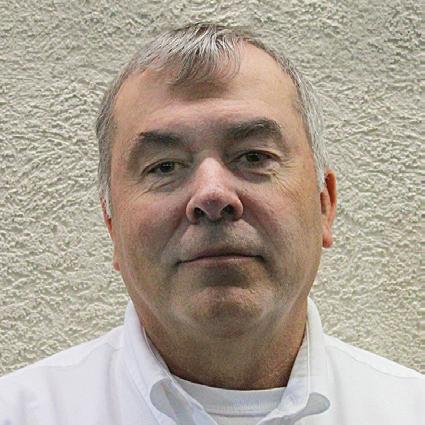
The pastor of Mt. Pleasant Baptist Church went to the mediumsecurity facility at the request of Don Stuckey, a deacon at his church and the missions leader for Macoupin Baptist Association. The prison chaplain wanted someone to re-start the “Experiencing God” class begun by Macoupin leaders years earlier.
“My idea was just to get in there, do that one class, and get out of there as quickly as possible,” Cleeton said. Now, he spends every Monday at Graham, teaching three or four classes. He preaches one Wednesday and one Sunday a month at the prison. Cleeton calls his ministry there “a time of refreshing.”
Inmates apply for Cleeton’s classes through the prison chaplain. They start with Experiencing God, based on the curriculum by Henry Blackaby and Claude King. Then, Cleeton leads them through a class called “Making peace with your past.” The third class focuses on Bible stories from the Old Testament.
The men he teaches “are like sponges, and they’re curious,” Cleeton said. During the Old Testament class, the men noticed different versions of the Bible used different words for why God wanted his people freed from Pharaoh’s rule. Some said to let the people go so they could serve God, while others said to let them go so they could worship him. The group looked it up in Strong’s Concordance, and saw the Hebrew word is the same for both.
“We had a half-hour discussion of service and worship, and that was generated by their questions,” Cleeton said. He’s seen small groups of his students save up to buy a Strong’s or a commentary Bible.
“When you only make a couple dollars a day, that’s really something.”
The ministry inside prisons and jails is vital, but there’s much to be done on the outside too, Cleeton said. Every church can be involved in ministry to inmates’ families, the pastor said, citing some statistics that say up to 20% of people in churches have an incarcerated family member.
“There’s a lot of hurting folks out there because of that,” Cleeton said. One easy entry point is Prison Fellowship’s Angel Tree ministry, which connects churches to inmates’ families through Christmas gifts. And Cleeton is part of an IBSA advisory team created to help churches engage in corrections ministry. For more information, go to IBSA.org/Missions.
Barna Research– Student ministry leader Nick Hall, founder of PULSE, a student-led prayer and evangelism movement, quoted in The Christian Post
“The Church has failed this generation. The Church has become known for judgment and not being a safe place to open up… The Church should be the most welcoming place on earth. If you’re hurting or broken or a mess you shouldn’t have to fake it there.”– The Washington Post CLEETON